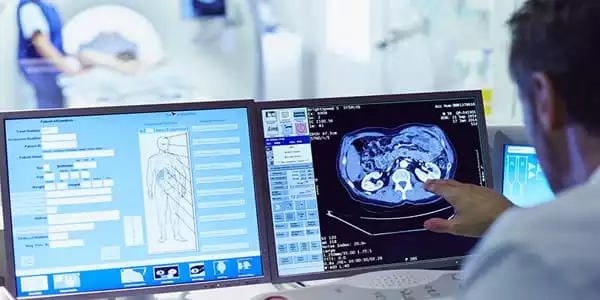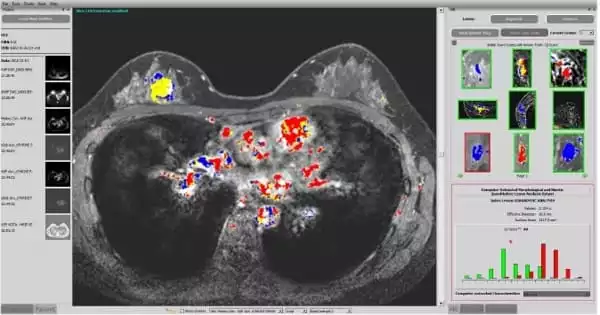A comprehensive international validation of artificial intelligence (AI) for diagnosing and grading prostate cancer has been performed by researchers. According to the findings, AI systems can diagnose and grade prostate cancer in tissue samples from diverse nations just as well as pathologists. According to the researchers, the findings indicate that AI systems are ready to be appropriately introduced as a supplemental tool in prostate cancer care.
Researchers from Sweden’s Karolinska Institutet performed a comprehensive worldwide validation of artificial intelligence (AI) for identifying and grading prostate cancer alongside international colleagues. The study, published in Nature Medicine, demonstrates that AI systems can diagnose and grade prostate cancer in tissue samples from various nations just as well as pathologists. The results suggest AI systems are ready to be responsibly introduced as a complementary tool in prostate cancer care, researchers say.
The international validation was performed via a competition called PANDA. The competition lasted for three months and challenged more than 1000 AI experts to develop systems for accurately grading prostate cancer.
Algorithms matching average pathologists were developed only ten days into the competition, demonstrating how competitions can accelerate rapid innovation for solving specific problems in healthcare with the help of AI.
Kimmo Kartasalo
Rapid innovation
“Algorithms matching average pathologists were developed only ten days into the competition, demonstrating how competitions can accelerate rapid innovation for solving specific problems in healthcare with the help of AI,” says Kimmo Kartasalo, a researcher at Karolinska Institutet and the study’s corresponding author.
The fact that different pathologists can reach different results even for the same tissue samples is a problem in today’s prostate cancer diagnoses, which means that treatment decisions are based on unclear information. The researchers feel that the use of AI technology has a high potential for enhanced repeatability, or increased consistency of tissue sample assessments regardless of which pathologist does the evaluation, resulting in more accurate treatment choices.

Accurate diagnostics
In previous studies, the KI researchers demonstrated that AI systems can detect cancer in a tissue sample, estimate the amount of tumor tissue in a biopsy, and grade the severity of prostate cancer in a manner comparable to international experts. However, the fundamental difficulty with adopting AI in healthcare is that AI systems are frequently highly sensitive to data that differs from the data used to train the system, and as a result, may not yield trustworthy and stable results when implemented in different hospitals and nations.
“The PANDA findings demonstrate, for the first time, that AI systems can produce an equally precise diagnosis and grading of prostate cancer in an international scenario as human pathologists. The next step is to conduct controlled research to determine how to best implement AI systems in patient care “Martin Eklund, associate professor at Karolinska Institutet’s Department of Medical Epidemiology and Biostatistics and the study’s final author, agrees.
“Future studies should also include a broader range of rare yet extraordinarily difficult biopsies, as well as samples from nations with a more diverse ethnic and demographic makeup,” he adds.
Not a replacement for human experts
AI-based evaluation of prostate cancer biopsies has the potential to improve diagnostic quality and, as a result, provide more consistent and equal care to patients at a reduced cost.
“The goal is not for AI to replace human experts, but rather to act as a safety net to prevent pathologists from overlooking cancer cases and to aid in standardizing assessments. AI may potentially be a viable option in areas of the world where pathology expertise is currently lacking “Lars Egevad, a professor at Karolinska Institutet’s Department of Oncology-Pathology and a prostate pathology expert who co-authored the study, states.
The research was carried out in partnership with researchers from Radboud University Medical Center in the Netherlands, Google Health in the United States, and the University of Turku in Finland. It was funded, among other things, by the Swedish Research Council, the Swedish Cancer Society, and the Swedish Prostate Cancer Federation. Several writers have industry affiliations and patents linked to prostate cancer detection or machine learning for medical pictures, and some have been compensated financially by firms.
Facts about prostate cancer:
- In Sweden, prostate cancer is the main cause of cancer death in men.
- In Europe and the United States, almost 20 million prostate tissue samples are evaluated each year.
- There is a global scarcity of pathologists, with many poor nations having less than one pathologist per million people.
- The difficulty in analyzing prostate tissue samples objectively and reproducibly is a barrier to lowering prostate cancer mortality.















